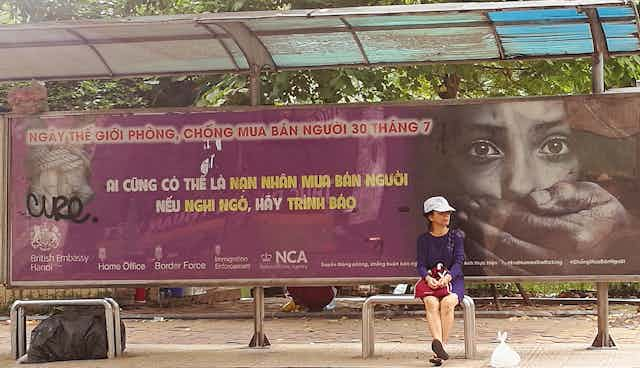In Vietnam, signs bearing the logos of UK government agencies carry messages warning potential migrants against attempting irregular travel to Britain. Seen in a video broadcast on three Vietnamese TV channels this summer and on advertising billboards, the British Ambassador and Miss Universe Vietnam advise, “Don’t gamble with your future,” warning that “traffickers always promise the earth but leave you vulnerable, alone, and hungry”.
The clip shows violence against a young man, who is eventually locked in the basement of an illegal cannabis farm, exhausted and despairing. The scene refers to the difficult circumstances faced by undocumented Vietnamese who grow marijuana in the UK.
The impact of these campaigns is unclear, but trying to scare people away is in any case a superficial strategy. Both British and Vietnamese governments need to address the structural conditions that led, this time last year, to the deaths of 39 Vietnamese, who suffocated in the back of a container lorry in Essex during their attempt to enter the UK.
The circumstances of cannabis workers, and those of their fellow nationals working in other sectors such as nail bars and food service, have increasingly been the attention and concern of human rights specialists.
In Britain, the authorities knew of these problems long before the Essex tragedy. Part of the UK’s international response was to fund posters in Vietnamese airports and bus stations that warn of the risks of trafficking.
In 2018, the UK Home Office supported a campaign featuring the goalie of the Vietnamese national football team. It targeted young people living in rural provinces such as Nghệ An, where most irregular Vietnamese migrants in the UK originate from, telling them to be suspicious of those brokering journeys abroad.
The Essex tragedy highlighted the danger of irregular travel to the UK in an incomparably shocking way. The pain of people mourning relatives who died in horrific conditions in a remote land was pervasive through Vietnamese media in the months afterwards. Beforehand, journeys to the UK barely made the news, even those that had gone wrong.
This has changed, and in the year since last October, new campaigns harness the emotion the tragedy generated to try and associate irregular travel to the UK with great risks and potentially dramatic downfalls. This messaging assumes that better awareness of the risks can reduce migration, but of course the reality is more complex.
Risk v reward
Even assuming these messages reach the target audience, posters and television spots may not make a difference. Vietnamese migrants did not wait for a tragedy to gather information on the risks involved with their travels. If they decided to go, it was not necessarily out of a lack of awareness, but from considering the opportunities it would create.
A crucial driver of migration to the UK is the lack of economic and social mobility opportunities for the residents of those mainly rural provinces of Vietnam that have not enjoyed the economic growth seen in cities that have experienced a manufacturing boom. Shows of wealth and success from those who did make it to the UK and returned – better houses, cars, education for their children – reinforces the appeal of making the journey despite the risks. For all its horror, the Essex tragedy could end up having less impact on migrants’ decision to make the same perilous journey themselves than the potential long-term economic consequences for the UK of Brexit or COVID-19.
In any case, the UK government will not passively wait. Over the past year, the Home Office and Border Force agency consolidated their collaboration with Vietnamese officials, police and border guards, strongly emphasising the necessity of suppressing irregular migration.
This increased partnership between governments has resulted in concrete changes, with Vietnamese officers now working on trafficking cases in Scotland, for example. In a rare move aimed at asserting authority and displaying concern for dangerous journeys, a Vietnamese court recently convicted four people for arranging unsanctioned trips to the UK.
It is clear that the UK is trying to use the climate of fear to encourage Vietnamese to stay put. It might have some impact, but it amounts to placing the responsibility to prevent more border fatalities in potential migrants’ hands. We should not forget that the 39 lives lost in October 2019 resulted from failures of both the British and Vietnamese states.
Reflecting on the impact of the campaigns on people considering irregular migration to the UK, a Vietnamese anti-trafficking specialist told me: “We can’t really deter them from going without offering alternatives.”
Investing in the Vietnamese provinces that are migration hotspots, supporting returnees struggling to rebuild their livelihoods, opening up pathways of legal and safe migration, but also strengthening job market safeguards in Britain should be the real priorities to prevent such a tragedy recurring. Trying to scare people who dream of a better future will not prove to be an effective protection strategy.

